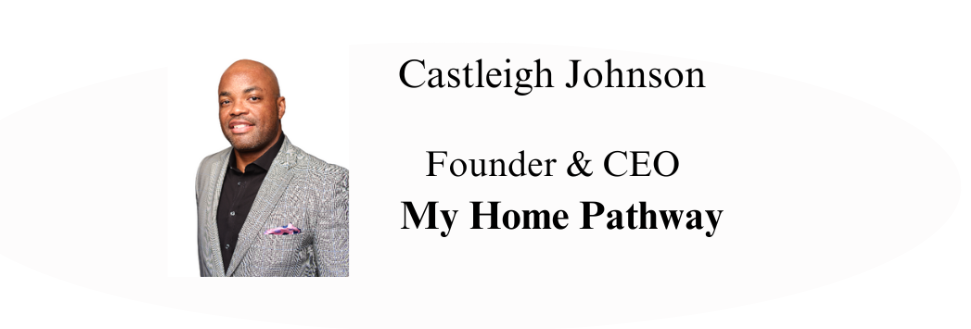Navigating the Future of Home Buying: Insights from the 2025 Homeownership Panel
The dream of homeownership remains a cornerstone of the American experience, yet for many first-time and underserved homebuyers, that dream feels increasingly out of reach. Rising home prices, limited housing supply, and fluctuating interest rates have created significant barriers to entry. However, as industry leaders highlighted at the 2025 Homeownership Panel, solutions exist—and hope is far from lost.
Held on March 13, 2025, the panel brought together some of the brightest minds in real estate, finance, and policy to discuss the challenges and opportunities facing today’s homebuyers. Moderated by Castleigh Johnson, the event featured Gregory Good (Invest Newark), Benjamin Codjoe (M&T Bank), Blair Smith (Milken Institute), and Todd Seward (North Central Jersey Association of Realtors®). Together, they explored actionable strategies to make homeownership more accessible and affordable for all.
The panel discussion covered key aspects of homeownership, real estate investment, and financial planning. Speakers highlighted the importance of maintaining flexibility in housing types and potential expanding search criteria to fit budgets in some cases. The discussion emphasized homeownership as a crucial factor in wealth accumulation and financial stability. Neighborhood changes were also addressed, with insights on how property ownership can help communities retain long-term value. Additionally, the conversation touched on mortgage structures, strategic investment decisions, and the long-term benefits of building equity. The session concluded with a focus on making informed choices to navigate market challenges successfully.
How to Afford a Home—Even in Today’s Market
Affordability was a central theme of the panel, and for good reason. With median home prices soaring and wages struggling to keep pace, many potential buyers feel priced out of the market. However, the panelists shared several strategies to help buyers overcome these challenges.
Gregory Good emphasized the importance of financial planning and preparation. “Buying a home is a long-term investment, and it starts with understanding your financial health,” he said. He recommended that buyers focus on improving their credit scores, paying down debt, and saving for a down payment. Even small steps, like reducing monthly expenses or taking on a side hustle, can make a big difference over time.
Benjamin Codjoe highlighted the role of mortgage pre-approval in the homebuying process. “Getting pre-approved not only gives you a clear idea of what you can afford but also shows sellers that you’re a serious buyer,” he explained. He also stressed the importance of shopping around for the best mortgage rates and terms, as even a slight difference in interest rates can save buyers thousands of dollars over the life of a loan.
The panelists also discussed the growing trend of co-buying, where friends or family members pool their resources to purchase a home together. “Co-buying can be a great way to split costs and make homeownership more attainable,” said Blair Smith. However, cautioned that clear agreements and legal documentation are essential to avoid potential conflicts down the road.
The Best Programs Available for First-Time Buyers
For many first-time buyers, the biggest hurdle isn’t just saving for a down payment—it’s knowing where to start. Fortunately, there are numerous programs designed to help.
Blair Smith provided an overview of federal programs like FHA loans, which offer lower down payment requirements and more flexible credit standards. He also highlighted state-specific initiatives, such as down payment assistance grants and tax credits for first-time buyers. “These programs can significantly reduce the upfront costs of buying a home,” he said.
Benjamin Codjoe shared insights into bank-sponsored programs, particularly those offered under the Community Reinvestment Act (CRA). “Many banks offer special loans with reduced interest rates or down payment assistance for buyers in underserved communities,” he explained. He encouraged attendees to reach out to their bank or credit union to explore their options.
Todd Seward emphasized the importance of working with a knowledgeable real estate agent. “A good agent can help you navigate the maze of programs and find the ones that best fit your needs,” he said. He also recommended that buyers take advantage of homebuyer education courses, which are often required for certain programs but provide valuable insights into the homebuying process.
What’s Next for Interest Rates and Housing Supply
The panelists also tackled two of the most pressing questions on buyers’ minds: What’s next for interest rates, and when will housing supply improve?
On the topic of interest rates, Benjamin Codjoe offered a cautiously optimistic outlook. “While rates have risen in recent years, we’re likely to see them stabilize in the near future,” he said. He explained that the Federal Reserve’s efforts to control inflation are starting to take effect, which could lead to more favorable borrowing conditions for homebuyers.
However, Gregory Good cautioned that buyers shouldn’t wait for rates to drop significantly. “Timing the market is always risky,” he said. “If you find a home you love and can afford, it’s better to act now than to wait for a hypothetical rate drop.”
The discussion on housing supply was equally nuanced. Blair Smith pointed out that the shortage of homes is a complex issue with no easy solutions. He also highlighted innovative approaches, such as converting underutilized commercial properties into residential units and building more accessory dwelling units (ADUs).
Todd Seward added that local governments and community organizations have a critical role to play. “We need to advocate for policies that encourage the development of affordable housing,” he said. He also stressed the importance of preserving existing affordable housing stock, which is often lost to gentrification and redevelopment.
A Call to Action
The 2025 Homeownership Panel wasn’t just a discussion—it was a call to action. The panelists agreed that collaboration between industry, and community organizations is essential to creating a more equitable housing market. “Homeownership is more than just a financial transaction,” said Castleigh Johnson. “It’s about building stronger communities and creating opportunities for generational wealth.”
As the event concluded, one thing was clear: while the challenges are significant, the tools and strategies to overcome them are within reach. By leveraging available programs, advocating for policy changes, and working together, we can make the dream of homeownership a reality for more people.
If you missed the panel, don’t worry—this is just the beginning of an ongoing conversation. Stay tuned for more insights, resources, and events as we continue to navigate the future of home buying together.
The dream of homeownership is alive and well—let’s make it accessible for everyone.
Disclaimer: My Home Pathway is a technology-driven risk improvement platform. We are not a mortgage broker or lender and are not representatives of any home loan programs. We are not a credit repair company, HUD-certified counseling agency, or one-on-one home counselor. While we offer mortgage-related services, we are not a bank, non-profit organization, foundation, or real estate agency. We may partner with those organizations to provide content and access related to our services.
The information provided is for educational purposes only and should not be considered credit repair advice or housing counseling services. For credit repair assistance or housing counseling, please consult with appropriate certified professionals or HUD-approved agencies.
Fintech Founder at My Home Pathway. VC Backed Startup. Financial Inclusion Leader and Speaker.
Risk and project management professional with experience in Federal Reserve banking regulations, risk management policies as well as risk management advisory services. Critical skills include credit risk analysis, capital markets, strategic planning, current state assessments and target operating models. Ability to assess evolving regulatory guidelines and potential impact on financial services organizations operationally and strategically.
Mr. Johnson received his Bachelor of Science in Management and International Business from Penn State University where he was a Bunton Waller Scholar and Division 1 athlete and his MBA in Finance and Accounting from New York University.





